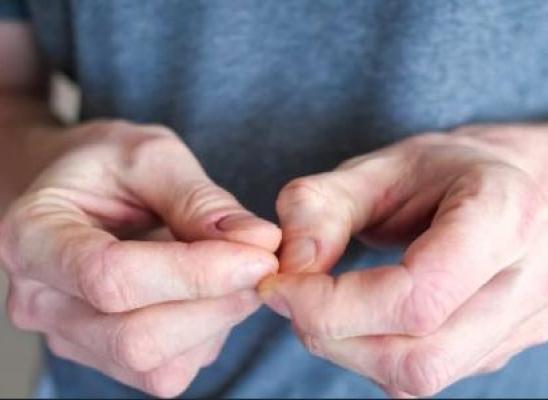
Online test
Find out the severity of your symptoms with this free online test
If you’ve researched treatments for your skin picking disorder, you’ve no doubt come across a therapeutic treatment known as Habit Reversal Training (HRT). HRT has long been considered the “gold standard” for treating body-focused repetitive disorders (BFRBs) such as skin picking.
While there is no definitive “cure” or singular treatment for skin picking, HRT has been consistently shown to help to reduce and manage symptoms. HRT can help you to break the cycle of picking and learn new ways of coping with triggers.
What is HRT?
HRT is a behaviorally-based approach to treating repetitive behaviors. It has been shown to be particularly effective in treating body-focused repetitive behaviors (BFRBs) such as skin picking, hair pulling, lip biting, and tics.
Don’t let the word “habit” distract you. Skin picking is more than just something one might consider a “bad habit”. However, it does have qualities that are in line with habits and habit formation. So, it’s not a coincidence that Habit Reversal Training (HRT) would be an appropriate approach to treating skin picking. HRT works by helping you to break the “habit” or stop the behavior you want to stop by replacing it with more desirable behavior.
HRT relies on the principle of competing responses. In its simplest terms, competing responses means that you can’t do two opposing things at the same time. For example, you can’t pick at your skin when you’re wearing gloves or clenching your fists.
The HRT approach consists of five critical components. Each one is designed to address an aspect of the behavior you want to change. In the case of a skin picking disorder, the goal is a reduction or cessation of the picking behavior and the resulting injury to the skin.
Main components of HRT include:
- Awareness Training to help you learn to recognize triggers and situations when picking is most likely to happen. As your awareness improves, you can begin to use strategies to discourage picking.
- Competing Response Training to learn how to substitute another behavior that is not compatible with (competes with) picking. Remember, you can’t do both at the same time.
- Stimulus Control to learn how to decrease or avoid the things or situations that trigger the behavior.
- Relaxation Training can help to reduce urges and the distressing feelings that can trigger the picking.
- Social support and behavioral reward systems are used to strengthen behavior change and treatment compliance. Social support training involves identifying and engaging supportive people who can help to encourage you to use your competing response or give you kudos when you’re able to use those newfound skills. Encouragement and that feeling of success is a powerful motivator!
How Effective is HRT?
Of the behavioral therapies, HRT has perhaps been studied the most extensively. There is ample support in the literature and anecdotally for its effectiveness in treating BFRBs. HRT has been shown to be the most effective approach in reducing the repetitive behaviors and symptoms seen with BFRBs.
However, HRT alone isn’t always effective for everyone. BFRBs are highly heterogenous and affect people differently. There is no one-size-fits-all. But that doesn’t mean that HRT can’t still be an important part of treatment.
While HRT is effective in addressing the behavioral aspects of skin picking, it cannot address the emotional and cognitive difficulties that often occur with skin picking and other BFRBs. Other mental health issues such as depression or anxiety, along with feelings of guilt or shame, are commonly seen along with skin picking and other BFRBs. Achieving long-term improvement has been more problematic and relapse is not uncommon.
This need to address both the behavioral and emotional difficulties of skin picking has led to approaches that combine HRT with evidence-based cognitive approaches such as cognitive behavioral therapy (CBT), Acceptance and Commitment Therapy (ACT) or Dialectical Behavioral Therapy (DBT). Using a combined approach can address both the behavioral and the emotional/cognitive aspects of skin picking.
HRT as part of a holistic treatment plan has even been shown to be effective in cases where the picking behavior along has been occurring for years! That means it’s never too late to seek help.
What to Expect from HRT
The beauty of HRT is that it is an easy-to-learn and use practice. Whether on your own or with a therapist, or both, you can learn strategies to gain control over your urges to pick. With the help of a therapist, you can even try one of the enhanced-HRT approaches such as combining HRT with a complimentary approach such as ACT.
In a recent SkinPick webinar, Dr. Vladimir Miletic took a closer look at HRT and discussed strategies that you can use to reduce picking behaviors.
You may recognize, and maybe already use, some of the strategies:
- Mindfulness can be an especially effective way to increase your awareness of what you’re experiencing.
- Journaling can help you to document your experiences. Simply keeping them in mind isn’t enough. You’re collecting data that you will need as you move forward. Keeping a journal can also help you to explore and understand your skin picking. Seeing your progress over time can be motivating too!
- Find activities that help to avoid or picking. You may already have some strategies that work for you. The idea is to find things that are easy, discrete, and work for you. Ideally, you want to choose things that you can do wherever you are.
Like anything, changing behavior takes time, practice, and patience. Working with an HRT-trained therapist can help you to explore and implement strategies that work for you. Whether you choose HRT or an enhanced-HRT, you can learn to manage your skin picking.
References
1. Skurya, J., Jafferany, M., & Everett, G. J. (2020). Habit reversal therapy in the management of body focused repetitive behavior disorders. Dermatologic Therapy, 33(6). https://onlinelibrary.wiley.com/doi/pdfdirect/10.1111/dth.13811?casa_token=5Ci1ua8n0zkAAAAA%3Atj3GKKbvITBE7AXQXlnGIeEqKhnV3FJxCe35RWzCOMxF--pXRIVQPJarUVn651hyAKuCF0o6gmNx0Q&
2. Kwon, C., Sutaria, N., Khanna, R., Almazan, E., Williams, K., Kim, N., Elmariah, S., & Kwatra, S. G. (2020). Epidemiology and Comorbidities of Excoriation Disorder: A Retrospective Case-Control Study. Journal of clinical medicine, 9(9), 2703. https://www.ncbi.nlm.nih.gov/pmc/articles/PMC7564859/
3. Jones, G., Keuthen, N., & Greenberg, E. (2018). Assessment and treatment of trichotillomania (hair pulling disorder) and excoriation (skin picking) disorder. Clinics in Dermatology, 36(6), 728-736. https://www.sciencedirect.com/science/article/abs/pii/S0738081X18301792?casa_token=0rCmTfNFVZ0AAAAA:bj6YeAZ8nGPjEsIGC0eUYA3LUCkJQox08oUBEIBc16mr4VgXRbcm7B9VloOI6AFL8mcHrG_m
4. Martinson, A. A., Nangle, D. W., Boulard, N., & Sigmon, S. T. (2011). Old habits die hard. Clinical Case Studies, 10(6), 411-426. https://doi.org/10.1177/1534650111428508
Online test
Find out the severity of your symptoms with this free online test
Start your journey with SkinPick
Take control of your life and find freedom from skin picking through professional therapy and evidence-based behavioral techniques.
Start Now



